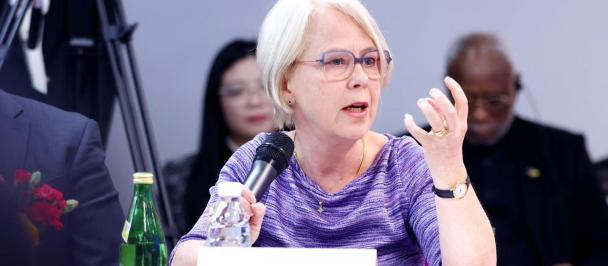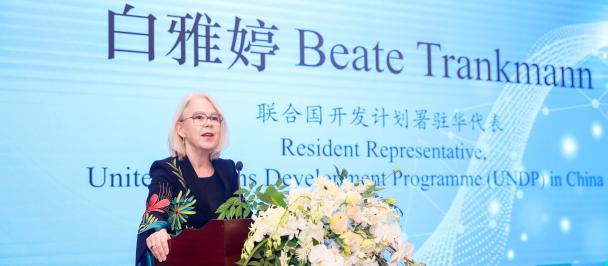Opening Remarks by Ms. Beate Trankmann at the Project Steering Committee Meeting
March 27, 2024

UNDP Resident Representative in China, Beate Trankmann, delivered opening remarks at the Project Steering Committee Meeting held in Beijing.
Excellency Ambassador Toledo,
Dear Mr. Jean-Louis Ville,
Distinguished guests and colleagues,
Good afternoon and welcome to the UN Compound.
As we enter 2024, the clock is ticking ever faster and we merely have six years left to realise the promise of the Sustainable Development Goals – to end poverty and prevent the worst effects of climate change by 2030.
And multilateralism is a must, for any hope of realising the SDGs. Because to achieve the SDGs anywhere, they must become a reality everywhere.
This is why I am delighted to welcome you all to the first Project Steering Committee meeting for “Effective Multilateralism in China towards Advancing the Sustainable Development Goals,” funded by the European Union.
Such cooperation is urgently needed. Converging crises – from conflicts, to Covid and climate change – have derailed years of development. Our societies are more unequal and polarized. And the natural world, we all depend on, hangs by a thread.
Just 15 percent of SDG targets are on track. And progress on over 30 percent has stalled or even regressed.[1]
No single country or actor can fix this alone. Stronger international cooperation is essential to save the SDGs, by sharing the limited resources available globally.
As China increases its resources – with annual foreign aid spending soaring more than 400 percent between 2001 and 2021, to 3.1 billion dollars,[2] -- it has also been redefining its role as a provider. Most notably, shifting focus from "foreign aid”, to “international development cooperation”.
In 2021, China’s Third White Paper on international development cooperation outlined this shift. And in another important pivot, it identifies the SDGs as a key objective of China’s development cooperation.
The role of multilateral and trilateral cooperation was also emphasized considerably more than in the previous two versions, as well as China’s engagement with actors like the UN.[3]
Indeed, China’s multilateral contribution to international organizations as a share of its net aid climbed from 8.3 percent in 2001, to 22.7 percent in 2019.[4]
"Multilateralism is a must, for any hope of realising the SDGs. Because to achieve the SDGs anywhere, they must become a reality everywhere."
This is where the opportunity of this partnership with the European Union lies: supporting China in translating these objectives into practical application in its development cooperation engagements. This will importantly also include providing international best practices, norms and standards to inform policies and implementation practices of key Chinese development actors for greater and more comprehensive SDG impact.
Together with FAO, UN Women and WHO, we will be focusing on critical international cooperation areas such as development financing, global health and international food security and climate.
We will also look at monitoring and evaluation practices and standards, leveraging the opening generated by recent efforts, including a new framework for China’s Foreign Aid Project Evaluation System issued by CIDCA last year.
We thank the EU for enabling this initiative.
Today, we are pleased to see the first project steering committee meeting convening representatives from the EU delegation in China and headquarters, UN agencies, along with EU member states and CAITEC.
We hope this meeting can be a platform for open dialogue and new ideas, to guide the project's design and implementation. UNDP colleagues will briefly introduce the project and present the first-year budget and work plan, which we are submitting to PSC members for review discussion and approval.
In closing, let us remember that challenges without borders, like poverty and climate change, can only be overcome through solutions without borders. So, we must act as one – across sectors, agencies, countries and regions – for sustainable development without borders, leaving no one behind.
UNDP stands ready to work with the EU, UN agencies and Chinese stakeholders, so China's International Development Cooperation effectively supports the SDGs in partner countries everywhere.
Thank you!
[1] https://unstats.un.org/sdgs/report/2023/The-Sustainable-Development-Goals-Report-2023.pdf
[2] China Statistical yearbook of Ministry of Finance
[3] https://www.undp.org/china/publications/issue-brief-brief-white-paper-chinas-international-development-cooperation-new-era

 Locations
Locations



